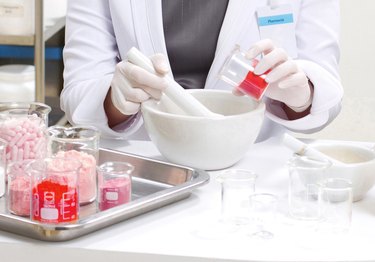
Bioidentical hormone therapy offers a different approach for patients seeking natural treatments. These drugs, similar to the body's natural substances, can play a positive role in human health. Bioidentical progesterone, for example, helps older women manage symptoms of menopause. Yet maintaining a natural balance between all hormones remains essential, and excess progesterone may cause negative reactions, like weight gain and disease progression. While bioidentical progesterone can be obtained without a prescription, patients should first consult with a doctor before beginning treatment.
Disease Progression
Video of the Day
Bioidentical progesterone is, in general, effective and safe. It can, however, worsen symptoms in some instances. A report by L. Hefler and co-workers published in the April 2010 edition of Anticancer Research looked at the effects of micronized progesterone, a bioidentical form of progesterone. Women typically take this form of hormone therapy as a vaginal suppository. Previous research suggested that it may be useful in treating uterine diseases such as cervical dysplasia, an abnormal growth on the cervix. Hefler et al., however, found that the bioidentical treatment failed to slow the disease and increased the rate of surgical intervention. The authors encouraged women with cervical dysplasia to seek other treatment options.
Video of the Day
Birth Defect
Progesterone plays an important role during pregnancy. Women with low progesterone often receive micronized progesterone to ensure safe labor and delivery. Yet such use may cause a birth defect. A review by S. L. Carmichael and associates in the May 2007 issue of Paediatric and Perinatal Epidemiology indicated that augmenting progesterone during pregnancy increases the risk of hypospadias. Male offspring with hypospadias have have difficulty urinating due to an unusual placement of their urethral opening. The enhanced risk remained small, and other studies failed to replicate this finding. Women should, however, consider this risk when using progesterone during pregnancy.
Cancer Incidence
Postmenopausal women often use hormone replacement therapy to combat the age-related reductions in estrogen and progesterone. Such use remains controversial because of potential side effects associated with replacement. A study by A. Fournier and associates offered in the April 10, 2005 edition of the International Journal of Cancer evaluated the risk of developing cancer following hormone intake in postmenopausal women. Elevating natural progesterone levels with either bioidentical or synthetic drugs increased the risk of acquiring breast cancer relative to control subjects. Using bioidentical progesterone conferred less risk, but the risk of using bioidenticals remained significant.
Breast Density
Sex steroid intake is known to affect the female breast. Common symptoms include increases in tenderness and density. These changes, while not necessarily cancerous, can trigger positive mammograms. An experiment by G. A. Greendale and colleagues described in the Jan. 1, 2003 issue of Journal of the National Cancer Institute showed that high levels of estrogen and progesterone increased mammographic density, whereas high levels of estrogen alone did not. Women should, therefore, carefully weigh the benefits and risks of progesterone intake.